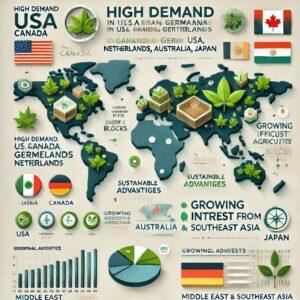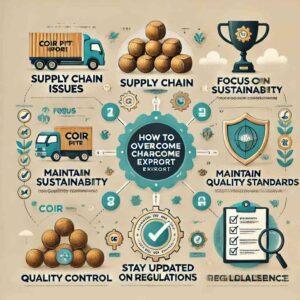Is There Any Demand for Coir Pith Blocks in the Export Business? Unveiling Opportunities in a Growing Market
Understanding Coir Pith and Its Applications | A Simple Guide
Coir pith, also known as coco peat, is a natural byproduct of the coconut husks industry. It is extracted from coconut husks and has excellent water retention and aeration properties. Because of these qualities, coir pith is highly sought after in industries like horticulture and agriculture. The eco-friendly nature of coir pith blocks has made them popular worldwide, offering a sustainable solution. If you’re curious about whether coir pith blocks are in demand in the export business, the answer is a clear yes. The global market is expanding rapidly.
This rise presents a sustainable business opportunity for cocopith exporters, particularly in regions like Tamil Nadu, India, which is a major hub for coconut cultivation and coir product manufacturing.
Global Market Trends for Coir Products | A Growing Opportunity
The Future of the Global Coco Peat Market: Key Insights
Recent research predicts significant growth in the global coco peat market. Between 2024 and 2033, the market is expected to grow at a CAGR of 4.6%, reaching a valuation of USD 4.09 billion in 2024 and USD 5.79 billion by 2033.

In recent years, the global demand for coir products, particularly coco peat blocks, has surged. With the increasing popularity of sustainable gardening and the search for eco-friendly alternatives to peat moss, coir pith has become a favorite choice worldwide. Countries in North America, Europe, and the Middle East are driving much of this growth.
Coco peat is not only sustainable but also renewable and biodegradable. These qualities make it ideal for organic farming and the horticultural industry. As more people and businesses focus on environmentally friendly solutions, exporting coir pith blocks presents a huge opportunity for entrepreneurs and manufacturers.
The global coir market is experiencing substantial growth, with projections indicating a compound annual growth rate (CAGR) of around 8% over the next five years. By 2028, the market is anticipated to reach a value exceeding $1 billion.
Key Factors Driving Demand for Coir Pith Blocks in Export Markets
Several key factors are behind the rising demand for coir pith blocks in international markets:
– Sustainability trends:
As global awareness of environmental issues grows, there’s a stronger preference for renewable and biodegradable products. Coir pith is a perfect fit for these trends, making it popular in agriculture and landscaping.
– Organic farming:
The global interest in organic farming is growing, and coir pith serves as an excellent natural soil enhancer, promoting organic plant growth.
– Landscaping:
Coir pith’s water retention and aeration make it an ideal substrate for landscapers seeking eco-friendly options.
– Environmental benefits:
Coir pith is a sustainable alternative to peat moss, helping reduce carbon footprints. This makes it appealing in regions with strict environmental regulations.
Where is the Demand for Coir Pith Blocks?

The export market for coir products is diverse, with high demand from countries such as:
– USA
– Canada
– Germany
– Netherlands
– Australia
– Japan
These countries have strong horticultural industries and a growing focus on sustainable agriculture and landscaping. Additionally, markets in the Middle East and Southeast Asia are showing increasing interest in coir fiber exports due to their environmental advantages.
By tapping into these regions, businesses in the coir industry can establish themselves as leaders in offering eco-friendly, high-quality coir pith blocks to global customers.
India’s Dominance in Coir Pith Exports
India is a leading exporter of cocopeat, with an average annual export volume of 350,000 metric tonnes. This reflects the country’s significant contribution to the global market for this versatile growing medium.
Below is an overview of the latest data on India’s cocopeat exports for the year 2023-24:
Cocopeat Export Statistics from India (2023-24)
| Details | Statistics |
|---|---|
| Total Shipments | 52,987 |
| Global Ranking | 1st |
| Number of Indian Exporters | 928 |
| Number of Overseas Buyers | 3,519 |
| Top Export Categories (HS Codes) | 53050040, 681520, 530500 |
Export data for 2023-24 reveals that coir pith accounted for 52.05% of the total export value, followed by tufted mats at 23.07% and fiber at 14.67%. India plays a major role in the global market as a leading exporter of cocopeat, offering it in various forms to cater to diverse applications and requirements.
India’s coir pith exports have shown a consistent upward trend over recent years, reflecting the growing global demand for this eco-friendly product. Below is a summary of the export volumes and values from 2019-20 to 2021-22:
| Financial Year | Export Volume (Metric Tons) | Export Value (INR Crores) |
|---|---|---|
| 2019-20 | 579,980 | 1,349.63 |
| 2020-21 | 566,661 | 1,919.74 |
| 2021-22 | 1,215,048 | 2,259.18 |
Note: The export volume for 2021-22 is sourced from the Coir Board’s Export Review for 2021-22
Top HS Codes for Cocopeat Exports
An HS Code (Harmonized System Code) is a standardized numerical code used globally to classify traded goods. Developed by the World Customs Organization (WCO), it ensures uniformity in international trade by categorizing products based on their type, material, and use. HS Codes consist of six digits, with additional digits often added by countries for more specific classifications. These codes are crucial for customs clearance, calculating taxes, and adhering to trade regulations. For example, cocopeat products have specific HS Codes to simplify their identification during export and import.
Below is a list of the most commonly used HS codes for exporting cocopeat, along with their product descriptions:
| HS Code | Product Description |
|---|---|
| 53050040 | Coir pith products such as wooden pallets, cocopeat blocks, and compost. |
| 681520 | Textile items made from peat fabrics, including various articles. |
| 14049099 | Loose or bulk cocopeat in its natural fiber form. |
| 14049000 | Compressed cocopeat blocks, ideal for easy transport and use. |
| 6302 | Bags filled with cocopeat, specifically designed for planting needs (varies by bag material). |
This breakdown simplifies the understanding of cocopeat products and their corresponding HS codes for export purposes.
Tamil Nadu’s Strategic Advantage
Tamil Nadu, with its extensive coconut plantations and proximity to major ports like Chennai and Tuticorin, plays a pivotal role in India’s coir pith export sector. The state’s infrastructure and skilled workforce contribute to efficient production and export processes.
Coco Peat Market: Business Growth and Expansions
The coco peat market is experiencing significant growth as businesses expand to strengthen their market presence and improve profitability. Recent developments highlight the industry’s momentum and focus on innovation.
Key Business Expansions
- New Coir Manufacturing Unit in Mangaluru (December 2023)
An Indian private-sector company launched a coir manufacturing and coco peat unit at the Mangaluru City Corporation (MCC) waste dump yard. This pilot project processes around 15 tonnes of tender coconut shells daily, sourced from MCC’s waste collection efforts. The initiative addresses waste management issues while boosting coco peat production. - Tamil Nadu Coir Business Development Corporation Initiative (January 2024)
Tamil Nadu Coir Business Development Corporation (Tancoir) announced a ₹25 lakh subsidy or 25% cost support for coir units establishing drying yards. Approximately 60 units are currently setting up these facilities, enhancing production efficiency and market reach.
Impact of Expansions
These initiatives enable companies to:
- Expand their product range.
- Strengthen their market presence.
- Capitalize on emerging opportunities in the expanding coco peat market.
As businesses continue to innovate and adapt, the coco peat market is poised for further growth, driven by increasing demand and sustainable practices.
Overcoming Challenges in the Coir Pith Export Business
While the potential for success in the coir pith export business is great, some challenges exist. Here’s how you can overcome them:

– Supply chain issues:
Building strong relationships with local suppliers will help ensure a steady supply of coconut husks and smooth logistics.
– Competition:
Focus on sustainability and high-quality products to stand out in the competitive market. Certifications, like organic farming labels, can help attract more buyers.
– Quality control:
Maintaining international quality standards is crucial. Implementing rigorous quality checks will keep your products competitive.
– Regulatory compliance:
Each country has its own regulations for imports. Staying updated on export guidelines can prevent delays and streamline the process.
Start Your Coir Pith Blocks Export Business Today!
With the increasing demand for coir pith blocks and a focus on sustainable agricultural practices, now is the perfect time to enter the coir export business. By addressing the challenges and delivering high-quality, eco-friendly products, you can carve out a successful place in this booming market.
Take advantage of the rising global demand for coir pith blocks and position your business as a leading cocopeat exporter in this growing industry. The future of agriculture is green, and coir pith is at the forefront!
If you’re interested in learning more about the cocopith business, feel free to visit Greglo Complete Infrastucure Here


good info!